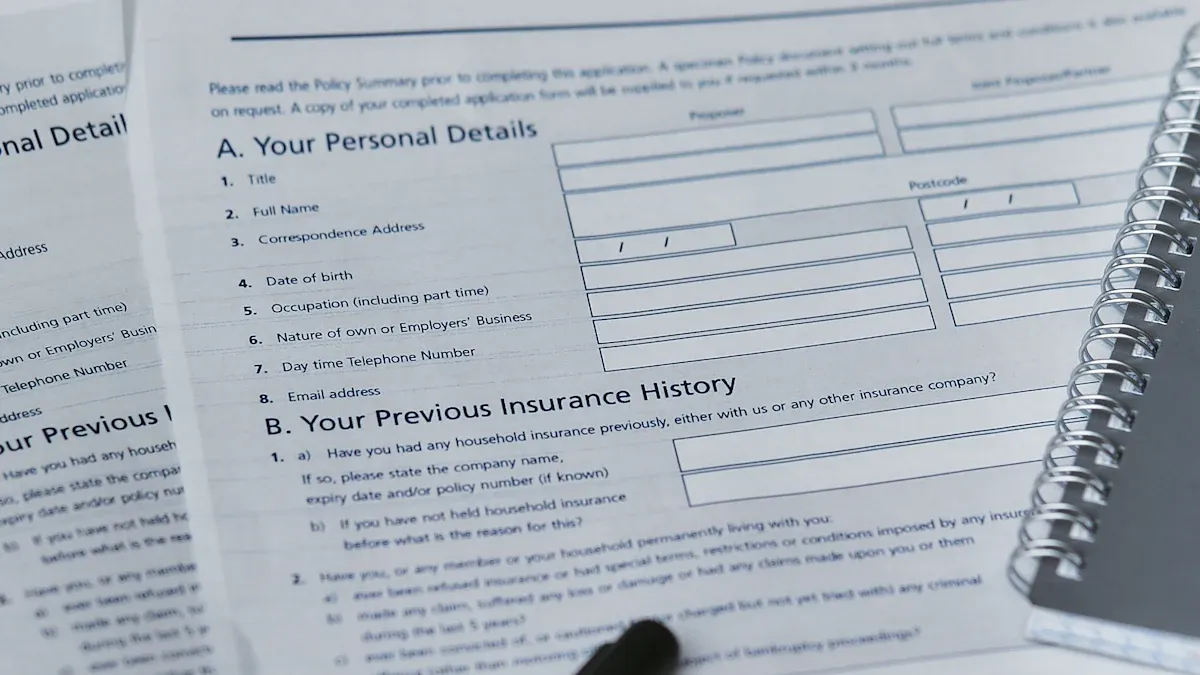
You may not know this, but insurance score 101: the hidden factor behind your premiums can really change how much you pay. Your insurance score helps companies choose your price. Drivers with a low score often pay $1,000 or more each year than people with a high score. If you find your insurance score and learn about insurance score 101: the hidden factor behind your premiums, you can save real money on insurance. Your score is important—look at it, make it better, and keep more money for yourself.
Key Takeaways
An insurance score is a number that helps companies set your insurance cost. If you have a higher score, you pay less for insurance. If your score is lower, you pay more.
Your credit history, claims, and driving record affect your insurance score. If you keep good credit and avoid claims, your insurance costs can go down.
You can make your insurance score better by paying bills on time. Drive safely and try not to make small claims. Check your score often to save money on insurance.
Insurance Score 101: The Hidden Factor Behind Your Premiums

What Is an Insurance Score?
You may wonder what insurance score 101: the hidden factor behind your premiums means. An insurance score is a number that insurance companies use. It helps them guess if you will file insurance claims. This score helps them decide how much you pay. When you ask for insurance, your score shows your risk. A high score means you pay less. A low score means you pay more.
The main reason for an insurance score is to help companies know who might have accidents or file claims. This makes setting premiums more fair and correct. Most people have an “average” score between 626 and 775. If you want to know your score, you can ask your insurer.
Tip: Knowing your insurance score 101: the hidden factor behind your premiums helps you see why your rates are what they are. It also helps you learn how to make them better.
How Is It Calculated?
Insurance companies look at many things to figure out your insurance score. The biggest thing is your credit. Good credit means you pay bills on time and handle money well. This makes you less risky to insure. If you have high credit, you may get a better insurance score.
Here are some things that affect your insurance score:
Credit history: This looks at how you pay bills, how much debt you have, and how long you have had credit.
Insurance claims: If you have made many claims, your score may be lower.
Driving record: Tickets and accidents can lower your score.
Other risk factors: These can be where you live, your job, or your age.
Not all insurance companies use the same formula. Some states have rules about what can be used. Some states do not let companies use credit at all. In most places, credit is a big part of your insurance score 101: the hidden factor behind your premiums. Claims history is also very important. If you have made many or big claims, your score may go down. Each company and state has different rules about what counts.
Tier | Score Range |
|---|---|
High | 776 – 997 |
Average | 626 – 775 |
Below Average | 501 – 625 |
Low | Below 500 |
Most people are in the average range. You can move up or down based on your credit and claims.
Why Insurers Use Insurance Scores
Insurance companies use insurance scores to guess risk. They found that people with higher credit scores file fewer claims. This means you are less likely to cost them money. If your score is low, you may file more claims, so your premium goes up.
There is a strong link between your credit and your insurance score. Studies show people with better credit have fewer claims. This helps companies set fair prices. For example, drivers with poor credit pay more for insurance than those with good credit. A report from the Federal Trade Commission says credit-based insurance scores are good at guessing who will file claims.
Insurance companies try to tell you what affects your premium. They say things like your age, where you live, your driving record, and your credit history matter. The process can seem hard, but knowing about insurance score 101: the hidden factor behind your premiums gives you more control. You can work on your credit, avoid extra claims, and keep your score high.
Some states have special rules about how companies can use your credit. For example:
State | Regulatory Restrictions on Use of Credit-Based Insurance Scores in Premium Calculations |
|---|---|
California | Prohibits use of credit scores for underwriting, rating, or setting premiums for auto and homeowners insurance. |
Hawaii | Bans use of credit ratings for auto insurance underwriting and rating; credit may impact homeowners insurance. |
Maryland | Homeowners insurers cannot use credit for coverage decisions or rates; auto insurers can use credit for new policies but not for cancellations, renewals, or premium increases. |
Massachusetts | Forbids use of credit information for auto and homeowners insurance underwriting and rating. |
Michigan | Prohibits use of credit scores to deny, cancel, or refuse renewal of auto/homeowners policies; cannot determine auto rates by credit. |
Oregon | Credit cannot be used to cancel or refuse renewal; can be used initially with limitations on credit report info. |
Utah | Credit can be used initially for auto underwriting but not as sole factor; after 60 days, credit cannot be used to cancel or refuse renewal; credit can only be used to offer discounts, not increase premiums. |
Most other states let companies use credit-based insurance scores as one of many things. They cannot use credit as the only reason to set your rate. If you improve your credit, you can lower your premiums in most places.
Note: Insurance companies share general ideas about what affects your premium, but the exact formula is often a secret. Lawmakers are working to make this process more clear.
Understanding insurance score 101: the hidden factor behind your premiums helps you take charge of your insurance costs. When you know what goes into your score, you can make choices to keep your premiums low.
How Insurance Scores Affect Your Premiums

Impact on Insurance Costs
Your insurance score has a direct effect on how much you pay for insurance. If your score is high, you usually get lower insurance rates. If your score drops, your premium can go up a lot. Insurance companies use your score to guess how likely you are to file insurance claims. They want to know if you are a safe bet or a risky one.
Let’s look at how much your score can change your costs:
Credit Tier Comparison | Average Annual Premium | Premium Difference | Percentage Increase |
|---|---|---|---|
Very Poor vs Exceptional | $6,254 vs $1,673 | $4,581 | |
Worst vs Excellent (6 mo) | $2,578 vs $813 | $1,765 (6 mo) / $3,530 (annualized) | 217% (6 mo) |
If you move your credit score up by just one tier, you could save about 54% on your insurance. That’s a big difference! Insurance companies check your score when you first sign up and sometimes when you renew. If your score changes, your insurance rates can change too. Higher scores mean you pay less, while lower scores mean you pay more.
Tip: If you keep your score high, you can unlock discounts and special programs that help you save even more on your premium.
Factors That Influence Your Score
Many things shape your insurance score. Some you can control, and some you can’t. Here are the main factors:
Credit history: Paying bills on time and keeping debt low helps your score. Late payments or lots of debt can hurt it.
Claims history: If you file insurance claims often, your score drops. Insurers see frequent claims as a sign of ongoing risk. Ten small claims can hurt your score more than one big claim.
At-fault accidents: If you cause accidents, your score goes down. Safe driving keeps your score up.
Location: Where you live matters. Living in a place with lots of accidents, theft, or natural disasters can raise your insurance rates. Urban areas with heavy traffic or high crime often mean higher costs.
Experience Modification Rate (EMOD): For workers’ compensation insurance, EMOD tracks your business’s claims and payroll history. A lower EMOD means you pay less. A higher EMOD means you pay more. EMOD changes every year based on your claims and safety record.
Here’s a quick list of how location can affect your insurance:
Living near the coast or in areas with hurricanes or wildfires can raise your premium.
If your home is far from a fire department, your costs may go up.
High crime neighborhoods often mean higher insurance rates.
Insurance companies use all these details to set your score. They want to know how risky you are as a customer. If you keep your credit strong, avoid claims, and live in a safe area, you can keep your score high and your premium low.
Credit Score vs. Insurance Score
Many people think insurance companies use your credit score to set your insurance rates. That’s not true. They use a special insurance score, which is different from your regular credit score.
Your credit score shows how well you handle money and pay back loans. Lenders use it to decide if you can get a loan or a credit card. It looks at things like your income, how much debt you have, and if you pay on time.
Your insurance score comes from your credit report, but it works differently. It does not look at your income. Instead, it checks your long-term credit habits and how you manage your money over time. Insurance companies use your score to guess if you will file insurance claims in the future. They also look at other things, like your driving record or the type of home you have.
Here’s a quick comparison:
Feature | Credit Score | Insurance Score |
|---|---|---|
Purpose | For loans and credit cards | For setting insurance rates |
Looks at income? | Yes | No |
Focus | Credit risk | Insurance risk |
Used by | Banks, lenders | Insurance companies |
Includes claims data? | No | Yes (plus credit habits) |
Note: Your insurance score can’t be the only reason you get denied coverage. Insurance companies must look at other factors too.
Many people mix up these two scores. Remember, your credit score helps you get loans, while your insurance score helps set your insurance rates. Both scores matter, but they serve different purposes. If you keep your credit healthy, you help both scores—and you can save money on insurance.
Improving Your Insurance Score
Steps to Boost Your Score
You can take control of your insurance score with a few smart moves. Here are some steps you can start today:
Keep your credit strong. Pay your bills on time and keep your debt low. This helps your insurance score and shows you handle money well.
Drive safely. Follow traffic laws and avoid accidents or tickets. Safe driving keeps your risk low in the eyes of insurance companies.
Avoid filing small claims. If you can pay for minor damage yourself, do it. Too many claims can make you look risky.
Update your home. Add security systems, smoke alarms, or water leak detectors. These upgrades lower your risk and may help your score.
Choose your car wisely. Pick a car that is safe and affordable, not flashy or expensive. This can help you get better auto insurance rates.
Check your credit report. Look for mistakes and fix them right away. Errors can hurt your score.
Bundle your policies. Combine home, auto, or renters insurance for possible discounts.
Tip: Small changes can make a big difference in your insurance score over time.
Best Practices for Lower Premiums
You want to keep your insurance costs low. Try these best practices:
Review your insurance score and policy every six to twelve months. Life changes like moving, buying a new car, or adding a driver can affect your rates.
Shop around for quotes. Different companies may offer better deals for your situation.
Raise your deductible if you can afford it. A higher deductible usually means a lower premium.
Keep your credit healthy by limiting new credit applications and paying down debt.
For business owners, focus on safety at work. Fewer accidents mean lower insurance costs.
Use technology like telematics to show safe driving habits and earn discounts.
Remember: Staying on top of your insurance score and making smart choices can help you save money year after year.
Understanding your insurance score helps you save money and build a strong financial future. When you keep your score high, you pay less for insurance and enjoy better options. Check your score often, review your policy, and reach out to experts if you need help or have questions.
FAQ
What is a good insurance score?
A good insurance score usually falls above 775. If your score is high, you can get lower premiums and better options.
Can you check your insurance score for free?
You can ask your insurance company for your score. Some companies share it for free. Always check your policy or call your agent.
Does checking your insurance score hurt your credit?
No, checking your insurance score does not affect your credit. You can review it as often as you want without worry.
Tip: Stay curious about your score. Knowing it helps you save money and make smart choices.
